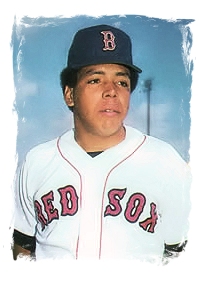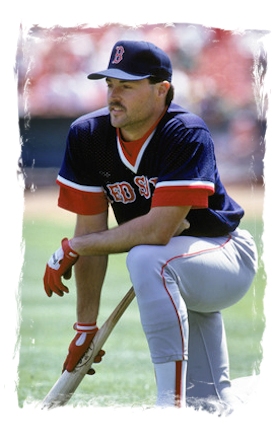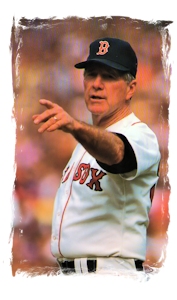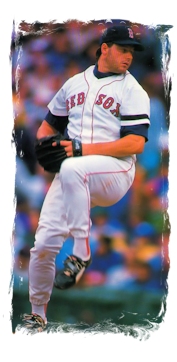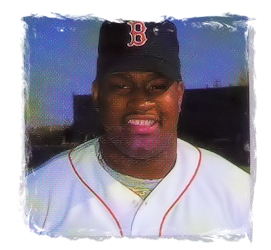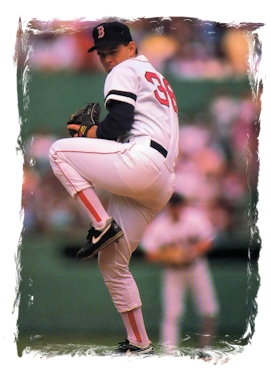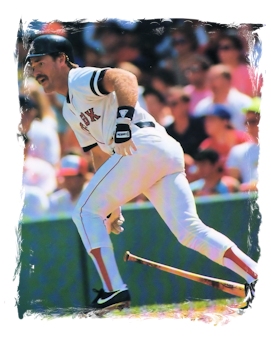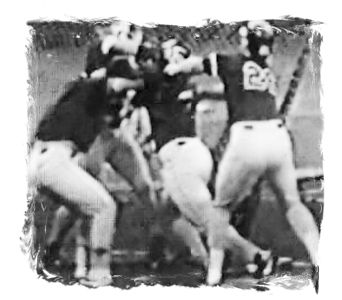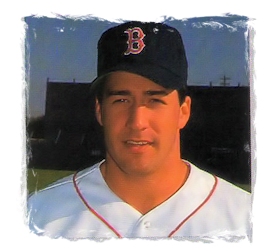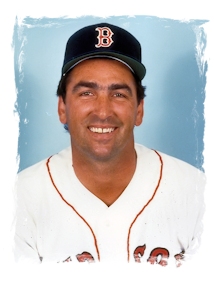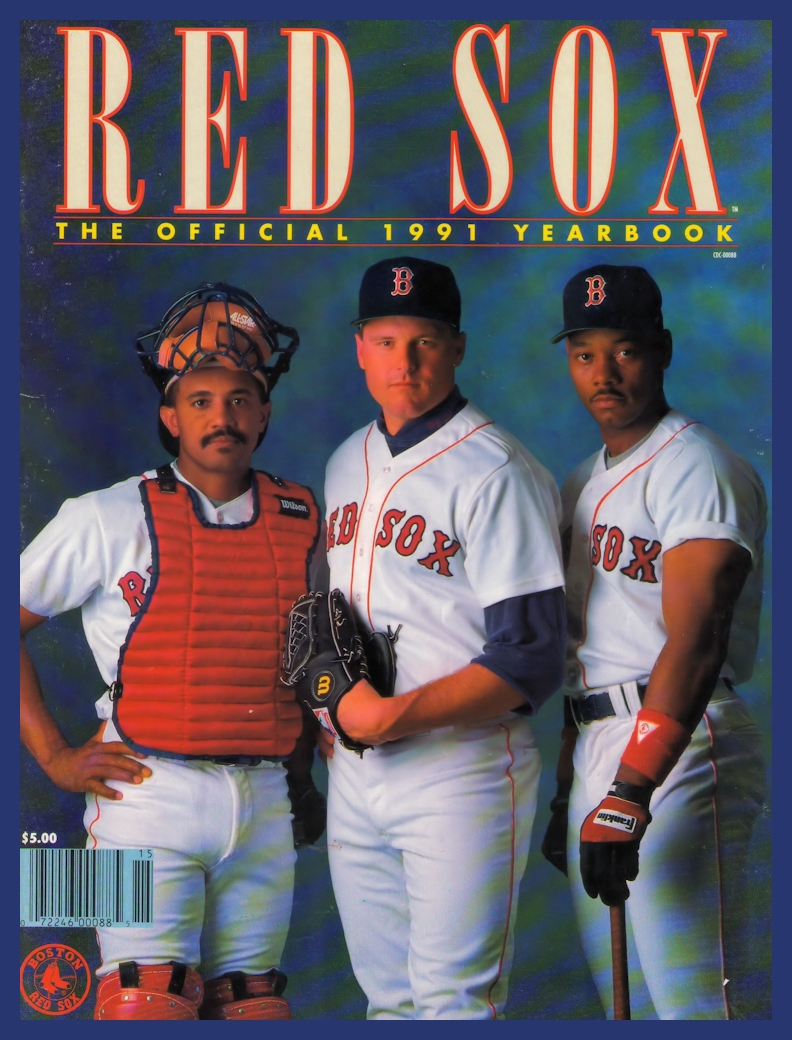|
1991 BOSTON RED SOX ...
Change was already in the air at Fenway Park. Mrs. Yawkey, like her late husband tried to solve a myriad of problems by throwing money in that direction. Before the season, the Red Sox cut ties with hitting coach Walt Hriniak, Dwight Evans and Marty Barrett. Mike Boddicker became a free agent and signed with the Royals. Lou Gorman jumped into the free agent market and signed free agent pitcher Matt Young was signed on December 4th for $600K. Jack Clark was brought in on December 15th for $8.7 million over the next three years. On December 19th, free agent pitcher Danny Darwin was signed for $1.2 million. In January, free agent infielder Mike Brumley was given $120K. Pitcher Tony Fossas was signed for $105K on January 18th. Those, in turn, forced them to pay Mike Greenwell $2.6 million and Tom Brunansky $2.5 million. The Roger Clemens signed a four-year extension worth $21.3 million plus postseason extras, making him the highest paid player in baseball. In January, Roger Clemens added to his erratic reputation and was accused of attacking an off-duty police officer during an apparent melee also involving his brother Randy at Bayou Mama's Swamp Bar, a Houston dance club. A grand jury charged Clemens with a misdemeanor instead of a felony for his role. The decision meant he would not serve time. Later, Commissioner Fay Vincent upheld Clemens' five-game suspension and $10,000 fine that had been levied by American League president Bobby Brown as a result of the Red Sox pitcher's behavior during Game #4 of last October's ALCS in Oakland, when Clemens bumped umpire Jim Evans and threatened umpire Terry Cooney. And even with this on his record, the Sox signed him to a $21 1/2 million deal for five years, making the Sox the highest payroll in baseball. Not all were happy in the Red Sox camp. Veteran first baseman/outfielder Mike Marshall said he would retire if the Sox failed to trade him, even though he was making $1.2M. The main reason was that with Mo Vaughn battling the incumbent firstbaseman Carlos Quintana, Marshall had little chance to play other than as a utility player. The other battle was for the shortstop position, between Luis Rivera and Tim Naehring. Apart from baseball on the field, the Red Sox decided to part ways with Winter Haven as their spring training site. The Sox were considering sites in Ruskin, Port At. Lucie and Venice. But Fort Myers was quickly becoming the team's first choice. A near tragedy was avoided in late March when Wade Boggs fell out of his wife's Ford Explorer as they were leaving a restaurant. A car cut her off and Boggs who was the passenger, didn't have his seatbelt on. As their car swerved to avoid the other car Boggs fell out because the door was unlatched. Fortunately, all he received was a few scratches and bruises.
Pitcher Mike Gardiner was traded from Seattle for Rob Murphy on April 1st. Gardiner doubted the veracity of the news. After all, it was April Fools’ Day. Gardiner said nearly six hours passed before he believed in the reality of the deal. Mo Vaughn was sent down to start the season in Pawtucket on April 2nd. Quintana won the first base job after hitting .319 with a homer and seven RBIs in 47 at-bats. On Opening Day, April 8th, Jack Clark hit a grand slam homer as the Sox and Roger Clemens beat Toronto, 6-2 at Skydome. The Sox then dropped the next three games, however. On April 11th, in his first appearance of the 1991 season, Tom Bolton pitched an effective 5 1/3 innings of relief following the inauspicious Red Sox debut of Danny Darwin, losing 6 to 4. The Red Sox beat the Indians at Fenway Park, 4-0, in a Roger Clemens three-hit shutout on April 13th. Clemens struck out 11 and walked none for the second straight game. He was 68-18 after Red Sox losses. He went to three-ball counts only three times during the game. The Sox broke it open on Carlos Quintana's two-run single to right field in the sixth inning. The Indians took three of the four games at Fenway and the Sox were quickly behind for 3 1/2 games. The raw conditions of a New England April turned to sweet, warm Fenway winds on the 16th when the Sox went on a six-game winning streak. With a .214 team batting average so far, the warmth produced three solo home runs and Danny Darwin's 5-2 victory over the Kansas City Royals. It was the first win by a Red Sox starter other than Clemens. The next night on April 17th Jack Clark was 2-for-4, with a homer and a double. Mike Greenwell also homered to give Tom Bolton the 6 to 2 win. After Red Sox Lou Gorman first denied that the team had any interest in him, on April 18th he re-signed Steve Lyons as a free agent. It turned out that Joe Morgan was one of Lyons’ biggest supporters. The fans were delighted to have Lyons back, although several of the players were not as enthusiastic because Randy Kutcher was waived to make room for him. In the game on April 18th Roger Clemens (3-0) gave up three singles, walked one and struck out 10, defeating Bret Saberhagen and the Royals, 1-0. In his three starts so far, he had pitched 25 innings, during which he had allowed one run and 12 hits, walked one and struck out 27. His ERA was 0.36. Greg Harris led the Sox to a 2-1 victory in Cleveland on April 20th, giving up three hits over six innings. A 6-4 victory over the Toronto Blue Jays on April 22nd was as close to the "perfect win" as any triumph. The Sox had three home runs from Tom Brunansky, Wade Boggs and Ellis Burks, and came back from a 4-1 deficit. Their bullpen pitched five scoreless innings and Jeff Reardon earned his fourth save in four chances. But Danny Darwin, who got touched for four runs on five hits, left the game complaining of tenderness in the back of his right shoulder and ended up on the DL. The Red Sox still got off to a nice start, finishing the six-game winning streak on April 23rd. It was testimony to Roger Clemens' dominance, that he could hurl seven shutout innings without his best stuff in a 3-0 victory against Toronto. After allowing just one walk in his first 25 innings, Roger Clemens issued four but still extended to 30 2/3 his run of consecutive scoreless innings, a streak that began in the second inning on Opening Day. As a result, the Sox found themselves in first place, up a game. On April 26th however, Clemens began to serve his suspension, but was named the American League "Pitcher of the Month". The Sox took to the road a beat the Royals, 6 to 4 on April 27th. They led 6-1 going into the ninth inning when KC scored three runs off Joe Hesketh. The Carlos Quintana dropped a throw to first and Danny Tartabull singled home the fourth run before Jeff Reardon struck out Kirk Gibson to finish the game. The unhappy Mike Marshall was 4-for-4 and was hitting .438 The next night on April 28th, the Sox won 2 to 1 behind Dana Kiecker. Wade Boggs was key, notching his first three-hit game of the season. After taking two of three in Kansas City, in Minnesota, Carlos Quintana crushed one in the eighth inning, a three-run, 430-foot shot off a section of bleachers in center field, leading the Red Sox to a 7-5 victory over the Twins at the Metrodome on April 30th. The Sox (11-7) finished the month in first place by one half game over the Blue Jays.
On the day Nolan Ryan threw his seventh no-hitter in Texas, the Red Sox were edged out by the Twins, 1-0 in Minneapolis. Greg Harris matched Scott Erickson pitch for pitch until the seventh inning when Dan Gladden took him deep for the only run of the game. Next was a trip to Chicago. Roger Clemens pitched a five-hit, complete-game, 7-2 victory over the White Sox on May 3rd. His return after his five game suspension was void of hassles with umpire Terry Cooney, with whom he had engaged in the notorious playoff confrontation. He had now amassed a 5-0 start with a 0.66 ERA. He struck out seven and walked just two. He rebounded from first-inning difficulty to pitch eight subsequent shutout innings. The next night, on May 4th, the Red Sox were led by their second-best pitcher at the time, Tom Bolton, who shut out the White Sox, 4-0. Jack Clark's average meanwhile dipped to .209 and the Sox offense still had not produced, but had scored enough runs to compliment the starting rotation, which was 11-4 with a 2.55 ERA and had allowed a .205 BA against them. The club ended the trip, on which they had won six of eight, by sweeping the three-game series in Chicago for the first time since August 1968. Kevin Romine starred in a 9-1 victory over the White Sox, on May 5th. Romine's homer, his last in the major leagues was a two-out grand slam. The Red Sox returned home to face the Twins. After losing the opener, they continued their winning ways by taking four straight. They thumped Minnesota, 8 to 3 on May 8th. Roger Clemens ran his record to 6-0, striking out ten. Everyone contributed except Jack Clark (.184 BA), who was 0-for-5 and hitless in his last 20 at-bats. Jody Reed was 3-for4 on the other hand, with two doubles and three RBIs. Clark turned things around, at least for one night, on May 9th. The boos turned to cheers when he helped complete the Sox comeback from a 4-0 deficit with a bases-loaded walk against Texas reliever Goose Gossage, breaking a 4-4 tie in the bottom of the seventh inning. The Sox went on to defeat the Texas Rangers, 8-4, with a five-run seventh, for a rare late-game come-from-behind victory. The Rangers were beaten again by the Sox in the next game, 5-3, on May 10th. Behind Matt Young's great game came Jeff Gray's clutch performance in relief, escaping a two on, nobody out jam in the seventh.
The Sox were rescued just in time on May 11th by first baseman Carlos Quintana (.323 BA) who had three hits and Jeff Reardon, who retired the last four batters for his 10th save in 10 opportunities. Since the first week of the season, the Sox had been the hottest team in baseball. They had won four straight, 16 of the last 20, and were 7-1 in May. The starters pitched at least six innings in 23 of 27 starts, posting a record of 15-5 with a 2.75 ERA. The club's 18-9 start was the best since 1982 when the Red Sox opened the season 21-9. They led the AL East by two games. On May 12th, the Sox celebrated Ted Williams and renamed Lansdowne Street, "Ted Williams Way". Roger Clemens was on the mound for eight innings, beating down the White Sox during the game. But it was in vain, as Chicago won the game in the tenth inning, 4 to 3. Tom Bolton was 4-0 after defeating the Chicago White Sox, 4-1, on May 14th, with an eight-hitter for 8 1/3 innings. Along with Clemens, Bolton had become almost a sure thing every time he pitched. Together, they were 10-0. The Red Sox and the White Sox played the longest game in major league history on May 15th. For four hours and 11 minutes, they battled with Boston winning 9 to 6. The Red Sox battled back after being down, 5-0 on a three-run homer by Tom Brunansky and a solo shot from Wade Boggs. Mike Greenwell then doubled in two runs to gain the lead. After losing three straight in Texas, the Sox hosted the Brewers at Fenway and won three straight. On May 20th, solo homers by Steve Lyons and Jack Clark did the damage, while Matt Young, Jeff Gray and Jeff Reardon combined for a four-hit shutout, 3-0.
The Sox rebounded with some spectacular hitting to come from behind and beat the Brewers, 10 to 6 on May 21st. Mike Greenwell had four of the 14 hits and Wade Boggs knocked out his 1000th Fenway hit. In the third game on May 22nd, Danny Darwin returned and Greg Harris combined with him in a 4-to-0 shutout of Milwaukee. For the second night, Tom Brunansky homered and his RBI single led the Sox to the win. On May 24th, the Sox outslugged the Tigers in Detroit, 10 to 9. At one point the Sox were up 9-3 and the bullpen almost coughed up the game, before Jeff Reardon retired the last four batters who posted his 14th save. The Sox were in first place by 1/2 game over Toronto. Next was a stretch just before and immediately after Memorial Day that the Sox started to unravel, winning only two games to finish the month. Jack Clark had been in a slump for most of the season and Matt Young couldn’t throw strikes. Young was trying to pitch around the sometimes dangerous Pete Incaviglia so he could face Travis Fryman on May 25th, a 3-2 loss, in Detroit. When Young walked Incaviglia to load the bases, Joe Morgan came racing out to get him. Young, whose ERA rose to 3.73 after his 2 2/3-inning stint, wasn't too happy to get the hook, gave Morgan some choice words, and tossed his glove in the dugout in disgust. On May 28th, Mel Hall launched a three-run walk-off homer off closer Jeff Reardon, as the Red Sox had lost four of their last five on the road trip. Sox pitchers had allowed 13 home runs in the last four games. The next night, however, Hall came up against Roger Clemens to a rousing ovation. Clemens whipped a fastball close enough to Hall's head so that everyone caught the meaning, then struck him out. It was one of those moments that often occur when Clemens is on and everything is right with the Sox. After two conspicuous losses, for one night, the "Rocket" returned to his devastating normalcy, allowing a run and three hits, walking one and striking out eight over eight innings in a 6-2 victory over the Yankees. But on Matt Young’s next start, he walked five, in less than two innings, in a 9-3 punishment at the hands of the Orioles at Fenway Park. Then after the Sox had lost Opening Day starting shortstop, Tim Naehring, to back problems, his replacement, Luis Rivera, badly sprained his shoulder in the game. Starting pitcher, Dana Kiecker was the next to go on the DL with an inflamed muscle in his throwing arm. On May 31st, they finished the month beating the Orioles, 7 to 2. Mike Gardiner in his Red Sox debut impressed Joe Morgan. He had been 7-1 for the PawSox with a 2.34 ERA. Jody Reed helped him with three hits including a triple.
But the Sox dropped three of four to the last-place Orioles over Memorial Day weekend and fell deeper into the slump that started when they were swept by Texas two weeks before. The Sox were 6-11 since May 15th and had lost eight of their last eleven, but the club had been artificially propped up by the equally slumping Blue Jays. The race in the AL East all but came to a standstill. The Sox were percentage points ahead of Toronto in first place, for six of the last seven days as they headed off to the West Coast. After a 3-0 loss on June 4th to the Angels on the first game of the road trip, the Red Sox, losers of 9 of 11 road games and now just three games over .500. Toronto had a shaky half-game lead and the Sox certainly didn't have to worry about being unseated from second place, with Detroit and Milwaukee also losing, in a division that is become more and more mediocre. Matt Young received a cortisone shot in his arm after having control problems and ended up on the DL with a tear in his rotator cuff. Signed to a three-year deal, Young had started 10 times this season, compiling a 3-3 record with a 4.20 earned run average. In 55 2/3 innings, he had walked 37. Young and Danny Darwin, the other free agent pitcher the Sox signed last winter, had not yet proven a sound investment. Darwin had been as ineffective as Young, compiling a 2-2 record with a 5.17 ERA. After losing two of three to the Angels and falling 1 1/2 games behind the Jays, the Sox had to do something, so they called up Phil Plantier from Pawtucket. Jack Clark (.196 BA) was benched and Plantier became the DH. In Oakland, Greg Harris, Jeff Gray and Jeff Reardon combined the beat the A's, 3 to 1 on June 7th. Then Roger Clemens (8-3) returned to the Oakland Coliseum mound on June 8th, for the first time since his world unraveled in five minutes during Game #4 of last year's playoffs. Clemens held the A's to two hits over eight innings and retired 20 of the last 22 batters he faced. The 8 to 1 victory was the second straight for the Sox (28-25). With the two wins, the club had taken a series at the Coliseum for the first time since May 1986. The Sox had not won consecutive games in 18 days. Carlos Quintana clubbed two home runs on June 10th in Seattle as the Sox won 6 to 2. His offensive outburst earned him the "Player of the Week" award. The next night, Ellis Burks homered as did Jack Clark for the second straight game, as the Sox beat Seattle, 8 to 5. The Red Sox went 4-5 on their west coast trip, 1 1/2 games behind the Jays as they headed back to Fenway. Led by Roger Clemens' pitching, Jack Clark's two-run homer and a seven-run seventh inning that included key strokes by Mike Greenwell (two RBIs) and Ellis Burks (three-run homer), the Sox roared back for a 9-4 win over the Angels against the Angels on June 14th. They gave the Angels a 13-3 beating the next night, on June 15th. They pounded out 16 hits as Mike Gardiner allowed the opposition only five hits. Carlos Quintana was 3-for-3 and drove in three runs, while Jack Clark brought in three more, two with another homer. Tom Bolton and Jeff Reardon combined to shut out the Angels, 2-0 in the third match-up on June 16th, before losing the next three games, but still tied for first place with Toronto. The Sox mounted a comeback vs the Oakland A's on June 20th. The 8-7 win, was sparked by a timely 12-hit attack highlighted by Tom Brunansky. The right fielder had three hits, knocked in three runs and scored the winner on Tony Pena's single to right, which finished a two-run rally in the eighth. On June 21st, they beat the A's again, 3 to 2, on Luis Rivera's inside-the-park homer in the sixth inning. They beat the A's for the third straight time the next day on June 22nd, 9 to 5. It was their fifth win in six times against Oakland this season. Then the momentum ran into a wall when they lost the final game to Oakland and then three straight to the Yankees at Fenway. They had fallen 3 1/2 games behind when the dust settled.
Joe Morgan had been frustrated with the club's inconsistent offense. The club had been held to three runs or fewer for the 33 times in 69 games this season. The Sox were 8-25 in those games. And so, Mo Vaughn was brought up from Pawtucket on June 27th. To make room, the Sox sent down a struggling Phil Plantier, the only Pawtucket player who had bested Vaughn’s power numbers the previous year. Vaughn made his big league debut on June 27th as the starting first baseman against the Yankees. With Ellis Burks being the only black player on the team, Mo was aware of the situation and wore #42 as a tribute to Jackie Robinson. He went hitless in his debut as the Sox lost to the Yankees, 8-0. Although he played relatively well, he had trouble adjusting to big-league pitching. On June 30th, Mo hit his first home run and almost became the second man to hit the ball out of Memorial Stadium in Baltimore. The man who did it was Frank Robinson, who, on May 8, 1966, in the second game of a doubleheader, hit a ball off Luis Tiant, that soared over the left-field bleachers and finally rolled to a stop in the back of the parking lot, where it was chased down by kids 540 feet from home plate. Leading off the fifth inning against Orioles right-hander, Jeff Robinson, Vaughn unloaded on a fastball and sent it curling like some kind of flaming projectile toward the back of the right-field bleachers, where it hit a fan in the 38th row of Section 30, five rows from the top of the stadium. But the Sox lost the game, 6-4, for nine losses in their last thirteen games, falling 4 1/2 games behind the Blue Jays.
Roger Clemens (10-5 with a 2.08 ERA) stopped the skid at County Stadium with a strong seven-inning stint as he and Jeff Gray combined on a 6-0, five-hit shutout of the Milwaukee Brewers on July 1st. Mo belted a two-run homer and knocked in four runs. Next, on July 2nd the Sox beat up the Brewers, 14 to 4, with 22 hits. Jody Reed, Mike Greenwell and Luis Rivera each had four of them. They followed that on July 3rd with a 5 to 3 win to sweep the series. They scored five runs on five hits in the first inning then turned it over to Greg Harris and Jeff Reardon who notched his 20th save. Rookie pitcher Kevin Morton’s debut came the first time he’d ever seen Fenway Park on July 5th. He retired the first eight batters he faced. The Red Sox offense had scored four runs in the first two innings, winning 10-1. Jack Clark drove in seven of Boston’s 10 runs. Vaughn drove in two. There was the only run scored off Morton, who worked a complete game, striking out nine while walking just one, allowing a total of five hits. The only other Red Sox pitcher to have thrown a complete game to that point in the season was Roger Clemens, who had four. A Sox' 7-4 victory over the Tigers at Fenway Park on July 6th, was punctuated by a bench-clearing brawl that erupted when Clemens hit John Shelby in the ribs with a 95 mph fastball. Clemens collected himself after being roughed up a bit in the brawl and held the Tigers at bay for the next six innings with help from some good defense. In May, Tom Bolton had a 4-1 record and a 1.90 ERA. But his May statistics were nothing but a distant reminder of what once was. His ERA ballooned up to 4.62 after his July 7th loss to Detroit. He had given up 37 earned runs in 46 innings (7.24 ERA) since then. Danny Darwin was then placed on the disabled list for the second time this season, because of inflammation and fluid buildup near his rotator cuff. Going into the All-Star break, the Sox struggled, as Darwin, Matt Young, Dana Kiecker and Mike Gardiner had been injured, while Sox bats had blown hot and cold. Meanwhile, the Blue Jays had won 15 of their last 18 games before the break and had a 5 1/2 game over the Sox in the AL East. Wade Boggs (.324 BA) was elected to start in the All-Star Game for the sixth consecutive year. Roger Clemens and Jeff Reardon were also selected by AL All-Star manager, Tony La Russa, to join Boggs. The All-Star game was played in Toronto on July 9th. Cal Ripken blasted a three-run to give the American Leaguers a 4 to 2 win. Roger Clemens gave up a solo homer to Andre Dawson. Wade Boggs got a hit and scored a run, while Jeff Reardon pitched 2/3 of an inning in relief. After the break, things continued to get worse. The Sox lost three of four in Minnesota. On July 13th, behind the five-hit pitching of Jack Morris and Rick Aguilera, the Twins defeated the Sox, 3-1, at the Metrodome. Using a lineup that included Carlos Quintana as the first baseman, Mo Vaughn as the DH, and Jack Clark on the bench, the Sox could do little against the veteran Morris. The Sox dropped to a season-low fourth place, just one game over .500 at 42-41. But the Sox salvaged the finale on July 14th, 5 to 3, behind seven strong innings from Joe Hesketh and the slugging of Luis Rivera and Jack Clark.
Joe Morgan was not to blame for the way the Sox had been playing. In the space of six weeks, they transformed themselves from "the most talented roster Boston has had since 1975 or 1978" into a pack of pathetic quitters who had a lack of guts and heart. There were not enough starters on the mound. There was Roger Clemens, but everyone else was either hurt or incompetent. The hitters had left more men on base than the population of Greenfield. On the bright side, Mo Vaughn had at least one RBI in 10 of the 15 games he'd started. He was 9 for 19 (.474) with 11 RBIs with runners in scoring position. On July 16th, Greg Harris pitched a gem and left with a seven-inning shutout. Jeff Gray and Jeff Reardon followed Harris to the mound and preserved a 2-0 victory against the White Sox. Harris was nearly flawless. Carlos Quintana's two-run single in the tenth inning gave the Sox a 4-2 victory in Chicago on July 17th. The Sox now collapsed, losing 10 of their next 11 games. They checked in with one of their more absurd losses this season, a 3-2, 11-inning downer to the Twins on July 19th. It ended finally when Steve Lyons sprinted in from left field for a shallow fly and slid just before the ball fell to earth directly behind him, allowing the winning run to score. The Sox were thwarted when no fewer than three players were hit by injuries - Mike Greenwell (ankle), Wade Boggs (ankle) and Carlos Quintana (foot). Jeff Reardon blew a ninth-inning lead, giving up a pinch-hit home run to tie the game. Mo Vaughn (2 for 33) was deep into his first slump and Tom Bolton found himself on the DL with a bad shoulder. They then found out Ellis Burks with tendinitis in his knees. The Sox had lost the next six games and nine straight at home, going winless since before the All-Star break (July 6th), and were 10 games out first in fourth place. It was the worst Red Sox victory drought at Fenway Park since 1927.
The only game they won came on July 24th in Texas. Three pitchers, led by Joe Hesketh, followed by Jeff Gray and Jeff Reardon, combined for a two-hitter, beating the Rangers, 2-1. Reliever Jeff Gray had racked up a 2.34 ERA and 0.795 WHIP in 50 games. Sadly, the pitcher’s baseball career ended on July 29th when he suddenly experienced dizziness, numbness, and slurred speech. Gray had not suffered a stroke, but it ended his professional career. Then, all of a sudden, the Sox picked themselves up as July ended. Down 2-1 on July 30th, they scored 10 runs in the third inning on their way to an 11-6 victory against Texas at Fenway. The 10 runs tied the major league high for the season, achieved twice before. It marked their biggest inning since a 12-run outburst in a 24-5 victory over the Cleveland Indians on August 21, 1986. The Sox scored 10 or more runs in an inning for the 24th time, extending its modern major league record. Carlos Quintana knocked out a grand slam, and a two-run double in the same inning off "Oil Can" Boyd, who was now with the Rangers, which got the inning rolling. It was his first in the majors, and third by the Red Sox this year (but first at home). He tied Tom McBride’s 1946 Sox club mark and also was tied for a major-league best, with six RBIs in one inning, becoming the 11th player to share the major league record. The next night, on July 31st, Jack Clark finally lived up to his billing and more, by bashing three homers, scoring four runs and driving in six, finishing with a 14th-inning blast that gave the Sox an 11-10 win on July 31st against the As. This was Fenway ball, featuring comebacks upon comebacks. It was also as inspired a Red Sox win as you would witness this season. Up, 4-1. Down, 5-4. Down, 10-9. Tied, 10-10. They won it on their last at-bat as Clark's homer, his 17th, which came on a 2-2 count and went over everything, ending a game that lasted five hours.
The Sox took 2 of 3 from the first place Jays, as August started. Roger Clemens won his 12th as the Sox topped Toronto, 5-3, on August 2nd. The next night, Joe Hesketh beat the Jays, 4 to 1 on a five-hitter. He posted three of the Sox's eight wins since the All-Star break and was 3-1 with a 2.27 ERA at Fenway.
Kevin Romine's last major-league appearance came on August 4th at Fenway Park against Toronto, when he played as a defensive replacement for Tom Brunansky. They then lost the next three straight in Kansas City, to fall 11 1/2 games behind. It was now that the Sox began to make one final push for their beloved manager and looked like they might cook up some more of "Morgan’s Magic". They headed up to Toronto. Carlos Quintana hit two home runs in Friday night’s opener on August 9th. Four other players had three hits and the Red Sox won 12-7. Greg Harris came out on Saturday, August 10th, and threw a four-hitter, while Jack Clark and catcher Tony Pena drove in three runs apiece to win 7-1. Mike Greenwell delivered a four-hit game on August 11, with Quintana and centerfielder Ellis Burks getting three hits apiece in a 9-6 win. Roger Clemens pitched the finale on August 12th and struggled, but Clark, Greenwell and Burks had his back. The trio combined to go 9-for-15 with ten RBIs and lead an 11-8 win. The Sox had scored 39 runs and 67 hits, during the four-game sweep, 27 with two out, and batted .401. They were now 7 1/2 games out, and breathing new life. And they didn’t slow down. In Cleveland, they split a doubleheader on August 13th, as Quintana's pinch-hit, ninth-inning two-run double off reliever Jesse Orosco won the second game, 7-5, after losing the opener. The charge continued with a riveting 2-1 win in the next game on August 14th. Joe Hesketh held the Tribe to six hits in seven innings. Dennis Lamp working in and out of an eighth-inning jam and Jeff Reardon posted his 30th save for the sixth time (a major league record). Ellis Burks was cranking up his game, drilling a two-run triple in the sixth inning, in a 6-2 victory in the fourth game on August 15th, as they then headed home. Pitcher Dan Petry was then traded from the Braves to the Red Sox for Mickey Pina. Dane Keicker was sent to Pawtucket to make room. Against the Royals, at Fenway in a 3-2 Sox win, on August 16th, Roger Clemens and Bret Saberhagen, the two youngest pitchers ever to win the "Cy Young Award" twice, dueled to a seven-inning draw, each allowing five hits and a run on a sacrifice fly before Phil Plantier hit his first major league homer, and it lifted the Red Sox to a dramatic 3-2 win. The Sox climbed back to .500 and had picked up seven games on the Blue Jays and now trailed the free-falling Toronto by 4 1/2 games. Two days later, on August 18th, Jack Clark's two-run blast, as well as clutch hitting by Luis Rivera and Steve Lyons, added up to a 5-1 victory over the Royals. In winning two of three, the Sox beat the Royals 7 of 12, for their first season-series win against Kansas City since 1979.
On August 21st, Wade Boggs ripped a two-strike pitch into the right-field bullpen in the bottom of the ninth to give the Red Sox a dramatic, 5-4, victory in the second game of a doubleheader sweep of the Cleveland Indians at Fenway. The next night, August 22nd, Jody Reed kept the Red Sox hopes alive in the ninth with a fluke single, then drove home the winning run in the 10th on a single to left. The Sox had won 12 of their last 14 games and cut the Jays lead to 3 1/2 games. The Red Sox were certainly on a red-hot roll. But as they headed out to the West Coast, Mike Greenwell revealed that he had a hyperextended right elbow to go along with the cartilage damage in his right knee. Greenwell suffered a loss of power over the past two years, and much of it was attributed to his assorted injuries. There was also dissension in the clubhouse that surfaced in Anaheim. Mo Vaughn and Greenwell engaged in a shouting match that escalated into a fight near the batting cage about an hour before the first game with the California Angels on August 23rd. The fight occurred in full view of fans who arrived early to watch batting practice and instead saw a boxing match.
What started as good-natured taunting erupted into punches when Vaughn challenged Greenwell to punch him, then insulted Greenwell for going into the batting cage rather than hitting him. Greenwell thought the rookie was carrying things a little too far. There was protocol between rookies and veterans. After the rookie pushed Greenwell into the side of the batting cage, teammate Jack Clark pulled Vaughn off. Both players remained in the lineup after manager Joe Morgan sent them to the clubhouse to talk it out. Vaughn wasn’t disciplined, perhaps since it was Greenwell's second altercation of the season, but his reputation as a tough guy was taking shape. And so, the Sox lost three straight to the Angels. Then in Oakland, Roger Clemens defeated the A's, 3-0, on a three-hitter, striking out 10 and walking only one on August 26th. Clemens didn't want Jack Clark's 22nd home run to be wasted. Not when Clark suffered what may be a small tear of his right calf muscle on the at-bat, had to trot slowly around the bases, and walked the final 90 feet to the plate. Clemens improved to 13-8, while his ERA went from 2.70 to 2.59. The next night on August 27th, the Sox pounded out 13 hits and took their second straight from the A's, 6 to 4. It was their eighth victory in 11 games this season. They cranked out six doubles, including four in the five-run third inning. In Seattle, the Sox beat the Mariners, 3-2, on August 30th. Joe Hesketh pitched in and out of jams and the game was tied after eight innings. In the ninth, after Steve Lyons doubled, Luis Rivera popped a base hit into center that scored him with the game-winner. Jeff Reardon posted his 33rd save in the bottom of the inning. To finish the month on August 31st, the Sox beat the Mariners again, 4 to 1, behind Roger Clemens. Clemens (14-8) held the Ms to just four hits. Mike Greenwell hustled out a double in the two-run sixth and drove in a run with a long sac fly in the seventh.
They had a convincing 13-2 victory and a three game sweep of the Mariners on September 1st, which was impressive on many levels, especially the way in which the Sox absolutely savaged Randy Johnson. Tom Brunansky had the biggest hit, a titanic grand slam in the second off Johnson's replacement, righthander Scott Bankhead. The Sox led, 10-1, after two; Wade Boggs went 4 for 6 and Brunansky had six RBIs. The Sox ended the road trip with a winning record and were basically where they had started it, five games behind the Jays. At home, after losing the opener to the Angels, the Sox began a seven-game winning streak. On September 4th, Joe Hesketh, Greg Harris and Jeff Reardon combined to shut out California, 2 to 0. Wade Boggs' eighth homer broke up a scoreless duel in the fifth inning. The Sox next took four straight from the visiting Seattle Mariners. On September 5th, the Sox were one out from losing. but Phil Plantier drilled a game-tying double with two out in the ninth. Then John Marzano's single landed in left field for the dramatic conclusion to a great game. On July 17th, the Sox had won just one game in their final at-bat. They had since done it eight times, including this 4-3 win over the Mariners at Fenway Park on Marzano's pinch-hit single with one out in the 10th inning. A day after the Red Sox won in extra innings, they mounted a 6-5 comeback victory over the Mariners. On September 6th, the Sox trailed, 5-3, but with five innings left, they mounted a resurgent offense paced by Tony Pena's three hits and two RBIs, including the game-winning seventh-inning single. In the third game on September 7th, Mike Greenwell had six RBIs on a vicious two-run homer in the first, a three-run double that rattled off the doorway near the left-field line in the second, and a run-scoring double in the fifth, leading the Sox to an 11-10 victory.
Led by Phil Plantier, who drove in five runs and pushed his average to .379, the Sox demolished the Mariners. 17-6, in the final game, as if they were still an expansion team. The Sox had not scored 17 runs in a game at Fenway since 1954. In the four-game sweep, Boston scored 38 runs with 50 hits. The thrashing of Seattle culminated in a four-game sweep. Sure, it was great that the Red Sox won their fifth straight, and eighth of nine. But they still had a 5 1/2-game deficit over Toronto, who also kept winning. Into Cleveland, the Sox traveled and beat the Indians in a make-up game, on September 9th, 4 to 3, in front of only 1695 fans. Next in Detroit, on September 10th, Roger Clemens (15-8) retired the first 19 Tigers and walked the 20th before hanging a slider to Alan Trammell, who singled with one out in the seventh inning. Clemens' unsuccessful bid for a perfect game and his first no-hitter, dominated what proved to be an important 4-0 win over the Tigers, as the Sox moved within four games of Toronto with 24 to play. Before playing the Yankees, on September 12th, Ellis Burks was a late scratch because of back problems that were serious enough for him to be examined by the Yankee physician. Mike Greenwell was 2-for-4 with three RBIs and Jack Clark lined a two-run single to give the Sox a 7 to 2 win. The next night, on September 13th, the Sox won 5-4 over the Yankees. The Red Sox seized a two-run lead after Tom Brunansky got his third hit and John Marzano was hit on the right foot by a pitch. Bob Zupcic sacrificed the runners into scoring position. Phil Plantier then saw a 2-2 slider glided into the zone, which he lofted six rows into the Yankee Stadium third deck. It was more evidence of "Morgan's Magic". The Sox were back within 3 1/2 of Toronto, after taking the series from the Yankees in the Bronx.
With three weeks to go in the season, the Red Sox met another struggling AL East foe the Baltimore Orioles at Fenway. On September 17th, Jack Clark stepped up against Orioles starter Jose Mesa in the sixth inning and shot a fly ball to right field. It kept drifting in a stiff wind, over to "Pesky's Pole", just a few rows to the fair side. Clark's 23rd home run would not go down as his most prodigious blast, but it did break a tie and give the Sox a 4-3 victory. The next game brought the Sox closer to the Blue Jays, in a 7-5 win over the Orioles. Phil Plantier went 2 for 4 and contributed to two early rallies. Jack Clark followed up his 304-foot homer the night before, with a hellacious line drive to dead center, that Joe Morgan called the longest line drive into the bleachers he'd ever seen. The Sox took the series and cut the Toronto lead to 2 1/2 games on September 18th. Next, Roger Clemens, three-hit the Yankees, 2-0, on September 20th, and was downright nasty. Jody Reed, who was in the leadoff spot, went 3 for 4, including an RBI double and a solo homer off the left-field foul pole. The Sox were 1 1/2 games out. In the next game against the Yankees on September 21st, the Sox had 14 hits and three stolen bases, which accompanied a four-hitter by Joe Hesketh on September 21st and a 12-1 Sox win. There were back-to-back steals by Steve Lyons, who stole second and third. Then Jack Clark launched an opposite-field shot, his 25th homer. Phil Plantier also belted a bomb over the right-field bullpen on a 3-2 count in the sixth, accounting for the ninth run. In the eighth, he was the front man in a back-to-back homer tandem that included Bob Zupcic's first major league home run. Since August 9th, the Sox were 31-10. An 11 1/2-game deficit, 44 days ago, had been nearly wiped out. They had moved within 1/2 games of the AL East lead with 14 games to play. But that was as close as they got. They lost the last game of the series to the Yankees and then lost 2-of-03 in Baltimore, falling 2 1/2 games behind with 10 games left. On the season’s next to last weekend, the Red Sox went to Milwaukee, 2 1/2 games back but still alive. It was there that the dream finally died. Kevin Morton pitched on Friday and gave up six runs in the sixth inning of a 7-5 loss. Brewers’ starter Jamie Navarro threw a four-hitter at the Sox on Saturday. The Sox led on Sunday, 4-3, in the eighth, but Jeff Reardon blew a save and they lost 5-4 to fall 4 1/2 games back. Even though the Sox salvaged the Monday finale, it was all but over. As if to underscore the point, the Red Sox mailed it in and lost five of their last six, finishing 84-78, seven games behind the Blue Jays in the AL East. Jack Clark was the DH and hit 28 home runs. His 87 runs batted in led the Sox, but the offense was not up to usual Red Sox standards, finishing seventh in the American League in runs scored. It’s not that there weren’t some good hitters in the Red Sox lineup. There was still Wade Boggs at third base, who churned out a .421 on-base percentage, hitting .332 with 181 hits and 93 runs scored. Tom Brunansky had 16 homers and played in most of his team’s games (142 of 162), but his .229 average was the lowest among the primary starting players. Carlos Quintana was consistent, attaining big-league career highs in home runs (11), runs (69), walks (61), runs batted in (71), batting average (.295) and OPS (.787) in another 149 games. But the lack of power prevented the whole from being as good as the sum of the parts. Mike Greenwell batted .300 and hit only nine homers. However, he led the team with 15 stolen bases. Jody Reed kept himself on base consistently with 175 hits. This was the third consecutive season that Reed hit more than 40 doubles, with 42. He batted .283, with five home runs, 60 RBIs, with 87 runs scored. He played 152 games at second base and just six at shortstop. The season was seriously compromised by tendinitis in both knees and continual back pain for Ellis Burks. The tendinitis disrupted his timing and power at the plate. He had only two home runs in his first 29 games. The back pain increased over the year and kept him out of the lineup for 11 games during a key late-September stretch run. His totals for the season reflected the extent to which he played hurt as he had only a .251 average with 14 home runs and 56 RBIs. A better reflection of the effects of the injuries was his uncharacteristically poor success rate on the bases with only six stolen bases in 17 attempts. Mo Vaughn(.260 BA) returned to Pawtucket to begin 1991 but was called up by the Red Sox after producing 14 home runs and 50 RBIs in 69 games. Steve Lyons played every position for the Red Sox except catcher. He even took another turn as a pitcher, hurling the ninth inning in a loss to the Twins and giving up two hits and no runs. And while Lyons’ batting average was .241, the Sox didn't resign him at the end of the year. John Marzano spent the entire season batting .263 with nine RBIs over 49 games backing up Tony Pena, who won a Gold Glove. Although Marzano hated the backup label, he embraced his role. Pena became only the second catcher to win a Gold Glove in each league; Bob Boone was the first. At the plate, it was a different story. He batted just .231 with a .291 OBP. Tim Naehring began the year hoping to prove himself, but midway through spring training, his back problems returned. Several days of rest helped, and he returned to the lineup in early April when Morgan named him the starting shortstop — the first rookie in 25 years to be in that role. But Naehring was soon mired in a batting slump that dragged on until it reached 0-for-39. Meanwhile, Naehring’s back pain worsened. He returned to the DL in late May, and after a bone spur was found in his lower back, he underwent surgery to remove it, ending his season after only 20 games and a disappointing .109 batting average. This season was Mike Marshall’s last in the major leagues. Late in spring training, Marshall suddenly went AWOL for a day because, despite his .464 average in the exhibition season, he wasn’t playing regularly. He appeared in 22 games for the Red Sox; some starts in the outfield, at first base, or designated hitter, and occasional pinch-hitting assignments. He hit quite well in limited opportunities (.290) but served as a utility-man. There was really no place the Red Sox needed him. After playing only three times in June (in part due to toe surgery) and pinch-hitting just twice the following month, he was released on July 21st. And the pitching certainly wasn’t going to cover for anything. The rotation came around to Roger Clemens (18-10) every fifth day and the "Rocket" covered for a lot of ills, winning 18 games with a 2.62 ERA and logging 271 innings, and winning his third "Cy Young Award". He led the league with 241 strikeouts and four shutouts. In seven of his games, he had 10 or more strikeouts. Finding pitching on the days of a non-Clemens start was always a roll of the dice. Everyone after him was a train wreck. In April, Joe Morgan said he foresaw Greg Harris as his #2 starter after only Clemens. Harris was in and out of the starting role a couple of times, spending the last two months as the setup man in the bullpen. He hit double digits in wins again, finishing 11-12, 3.85 after a 1-5 start through May. Tom Bolton was added to the rotation and remained there until July when he lost his spot. His ERA stood at 4.62 when he was removed. Shortly after, he went on the disabled list with a back issue. He missed a month and returned in the second half of August, finishing the season with three bullpen appearances and three late-season starts. For the season, he posted a 5.24 ERA and an 8-9 record. Even though Mike Gardiner considered himself one of the more obscure players on the team, Gardiner, who lived close to Fenway Park, had to stop taking the Green Line to games because too many fans would recognize him. He eventually changed his commute by giving up public transportation in favor of walking. Gardiner finished his rookie campaign 9-10 with a 4.85 ERA. In his first season for the Red Sox, Matt Young started 16 games, relieved in three, and went 3-7 with a 5.18 ERA. He spent time on the disabled list with a slightly torn rotator cuff. His disappointing season earned him the nicknames “Sigh Young” and “Door Matt.” Kevin Morton his first season in the majors with a 6-5 record and a 4.59 ERA. He had struck out 45 and walked 40, giving up nine homers. This proved to be his only year in the big leagues. The injury bug bit Danny Darwin in his first season with the Red Sox. After three starts in April, he went on the disabled list because of a pulled muscle in his right shoulder and bronchial pneumonia. He came back at the end of May, going 2-5 with a 4.45 ERA over five starts, before returning to the DL in early July with tendinitis in his shoulder. He was shut down for the season, finishing 3-6 with a 5.16 ERA, and surrendering 15 homers in 12 starts. The Red Sox were able to get good work from closer Jeff Reardon who saved 40 games over 59 1/3 innings, with a 3.03 ERA. In 92 innings reliever, Dennis Lamp’s 4.70 ERA was significantly higher than the team’s 4.01 ERA. Tony Fossas was used extensively. He relieved in 64 games and was 3-2 with a 3.47 ERA. Because of how he was used, Fossas rarely had a save but he contributed. His 64 appearances led the team and he was credited with 18 holds. Dana Kiecker signed a one-year deal and made the roster after allowing just one run in 19 innings during spring training, but working as a reliever. He started in April and won, picked up another win in May, but in two late-May starts gave up 11 earned runs in just 4 1/3 innings of work. He went on the disabled list with an inflamed muscle in his right elbow. The issue had arisen during spring training but he had tried to overcome it. He went to Pawtucket on a rehab assignment and was brought back in July. He relieved in five games and started one, ineffectively. Kiecker was sent back to Pawtucket and was recalled in early September. The general feeling was that by trying to pitch through his injury, he had harmed himself. He finished with a 7.36 ERA over 40 1/3 innings. In November Kiecker had arthroscopic surgery on his right elbow. Jeff Gray's tune-up in spring training had been strong: four saves and 1.29 ERA in 14 innings. From Opening Day through the end of July, Gray was the best relief pitcher on the Red Sox and one of the best in the American League. On Tuesday morning, July 30th, Gray completed his pregame warmup ritual: throwing in the outfield, then light lifting in the weight room. While sitting on a stool in front of his locker, suddenly his nose burned, and his legs went numb. He became lightheaded and his speech slurred. The right side of his body became paralyzed. He was rushed to the hospital, where he stayed for several days. Team physician Dr. Arthur Pappas first called the episode a spasm or migraine attack, denying that it was a stroke: “The CAT scan was negative, so we’re 99 percent sure it was not (a stroke),” said Pappas. Further tests were done and determined that a blood vessel in Gray’s brain may have constricted and reduced the blood flow. It turned out to be a congenital problem, unrelated to baseball activities. He sustained brain damage that kept him from ever fully regaining the strength and velocity in his pitching arm or the overall control and coordination that he needed to take the mound again. He never played baseball again. The Sox ownership felt that the team failed them because of the high salaries they were willing to pay out with nothing returned. They couldn’t fire the players, so they fired Joe Morgan two days after the season ended.
|



